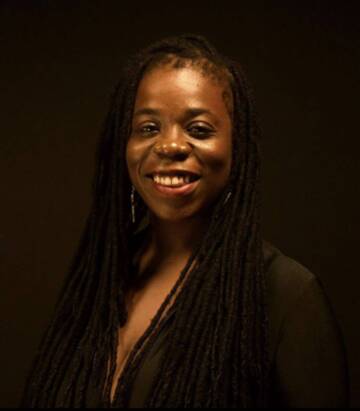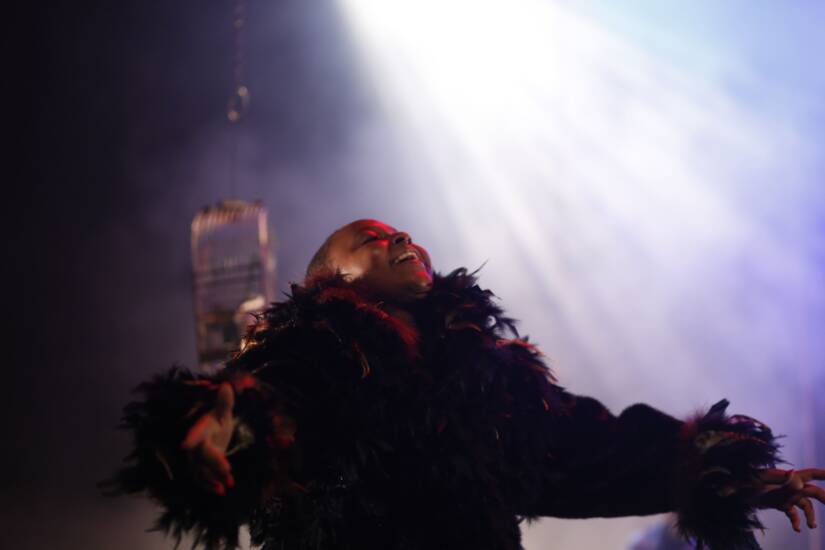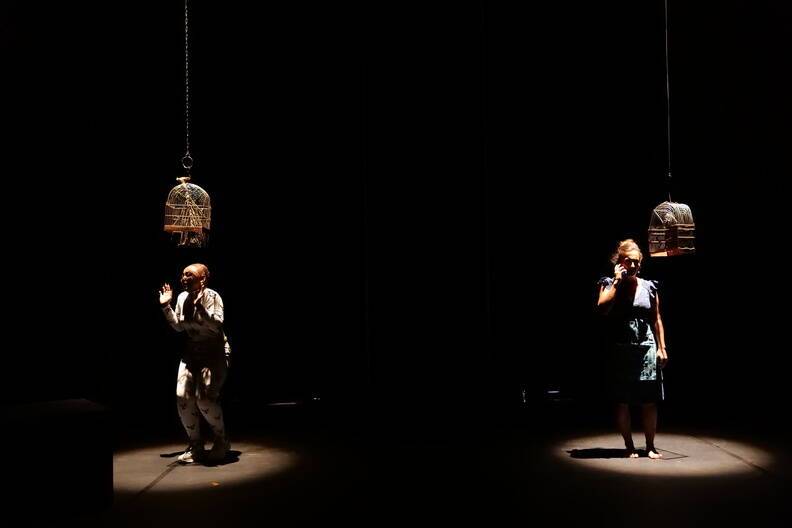With her extraordinary woman-orchestra energy, Berekia Yergeau writes, directs, organizes the production and distribution of her shows, while administering his company OTEP.
Her overflowing activity very quickly led her to make her work known, which means, for this young artist living in Kourou, the objective of a regional, hexagonal and international influence: the arc of the Caribbean, Quebec, the Africa and metropolitan France. A radiance that would not be possible without the fertilizing power of her adopted country, Guyana, which she says cannot be lied to. ” I am very inspired by this territory. I find there the crossbreeding in which I myself grew up. There is a very beautiful coexistence here that I have rarely seen elsewhere, even in America. It is a theatrical thought specific to Guyana, a multicultural land rich in itself. »
Born in Haiti, raised in Quebec by her adoptive parents, Berekia Yergeau studied arts, literature and theater performance in Montreal. Passionate about poetry and drama, she already had the publication of a collection of poems and a few theatrical experiences when she discovered Guyana and made the choice, in 2014, to settle there.
She is first noticed for her work with young people in different structures. Within the Maztek company, she founded a theater group of young high school students, to whom she made discover that artistic creation, in the dramatic form in particular, is not limited only to the classical and contemporary repertoire of mainland France, offering them ‘address and play’ a theatrical thought specific to Guyana, I am thinking for example of the texts ofElijah Stephenson. »
At the same time, she makes known her own original works: it is first of all Accompany merepresented in July 2019 at Overseas Theater in Avignonthe famous TOMA of the Chapel of the Incarnate Word, then like the bird, also passed through the TOMAand Between dogs and wolvesa “work in progress” created in Paris at the Modern laundry.
In August 2021, she founded the company OTEP (Theatrical and Poetic Works), a nod to the salvation of ancient Egypt, Hotep, which means to be in peace.
Berekia Yergeau, what do the ONDA meetings devoted to overseas creation, in which you will take part in on December 1st at the Carreau du Temple, in Paris, mean to you?
Berekia Yergeau: An essential moment to highlight the strategies that work with regard to the distribution, for example, of overseas shows. But also the opportunity to think about the shortcomings of our territories and to find how to develop ourselves, to allow what I call “theatrical thought” to exist in our country, to be enriched, to flourish.
What did you learn, in this respect, from your first creative experiences?
From the start of a project, we must be wary of the isolation of French Guiana, not only a geographical isolation, but also an artistic one. In fact, despite three excellent venues for presenting our work, I dread interpersonal relations and instinctively I need an outside perspective. We have to find a good way to raise the level of our work, which allows us to really envisage a wider distribution.
For like the birdwhich is written in verse, we responded to a call for projects which allowed us to come and work in Normandy, at the factory, the house of poetry in Val de Reuil. This is a show for which I gathered testimonies on the “mules”, that is to say the drug couriers. An alarming phenomenon which sometimes affects very young people, very hard stories, which depict a deep gap between the generations among the Guyanese, and the fairly frequent interbreeding in these families. It was really interesting to present our work to an audience so far removed from these realities, and to realize that the text was received with great emotion. Financially speaking, we were able to do this residency thanks to the aid for creation and the Support fund for artistic and cultural exchanges (FEAC)which helps us a lot.
How is the distribution going beyond Guyana?
For two years that we have been broadcasting like the bird, you could say that I take care of it entirely myself. We managed to set up a great tour of 70 dates (the average for a production in Guyana is between three and fifteen dates, with a few exceptions), to which are added 25 dates for schoolchildren. And as the piece was thus exported a lot, it gained notoriety in Guyana itself where it is in demand again, which leads us to continue the tour.
However, it is quite difficult for us to access cinemas in France, because we are not well-known companies there, and the distribution agencies are overwhelmed. A fairly natural door would be to be programmed in the Scènes Nationales Antillaises, our neighbours, but it’s also difficult! And yet, the French CDNs identify us better and take the risk of welcoming us more willingly.
Paradoxically, it is the Alliance française de Sainte-Lucie, which wants to set up a tour of like the bird in the English-speaking Caribbean, using surtitling, which will give us visibility in our greater region.
And internationally?
The international was an opportunity for us to have another experience to think about: we were invited to the It’s happening in Kin festivalto Masa from Abidjan to Dol’en scene festival and at Mantsina festival on stage in Brazzaville, but not all of these festivals could support our fees. The FEAC, whose support concerns travel, cannot make up for this. We would then need another envelope, but by force, we would end up moving to assistantship, where we only want to develop a cultural economy.
But we said to ourselves that we would go all the same, because it is the opportunity to enter the networks that surround big names in current theater such as those of Hassane Kassi Kouayté who today directs the Limoges Francophonie Festivalof Dieudonne NiangounaofAbdon Fortunateof Laetitia Ajanohun and others: strong networks present in Africa but also in mainland France. It is absolutely relevant for us to register and work with these festivals, given our isolation and our distribution difficulties.
Do these great distances also create logistical problems?
Whether we go to play in Avignon or in Africa, we always get there with a time difference of at least eight hours, and always the day before the performance since we don’t have the means to afford many hotel nights. In addition, we sometimes have to resume the play after several months of interruption. The press bothers for the first performance, it is not a question of missing it.
This is where the agreement of our company by the DGCA allowed me to make very concrete progress: I went to see the cultural center of the city of Kourou who kindly made available to us a storage room of 50 m2, to turn it into a creative lab. This little lab allows us, among other things, to rehearse ahead of our broadcast periods. We also make it available to other artists in the area, because it is an issue that concerns us all here: bringing together the professional conditions for artistic creation.
Basically, your location away from distribution networks leads you to strengthen more than ever the strategic aspect of your business?
Absolutely, and our latest creation, Between dog and wolf, convince me of it! Initially, it was a tremendous opportunity offered to us by the Parisian modern laundry , but under very rigorous creative conditions, at least for me: three weeks of residency, construction of sets and making of costumes included, for a 50-minute creation, intended to be broadcast almost immediately. I had to find a way to adapt.
This is why I made a show in two parts, one very dense, very frontal, of 35 minutes, followed by a part in interaction with the public, more relaxed, humorous and participative. And then, for the distribution, we dared to project it on 2024, after a new time of creation that our lab and the agreement of our company will allow us. We hope to play Masa in Abidjan, TOMA in Avignon, the Canadian festival Transamericas and of course at home in Guyana.
How do you see the development of creation in Guyana itself?
We are here in South America! In this regard, the initiative of the Alliance française de Sainte-Lucie interests me a great deal. Guyana, Suriname, Barbados, Trinidad… we should build a close and lasting network where everything that is created in Guyana will find a listening ear: spirituality, storytelling, orality, as much as theater, which will resonate with elsewhere perhaps more than in mainland France. These paths cannot be neglected, since they are part of the living cultural source of the continent where we find ourselves.
Berekia Yergeau: “Guyana is a place of very inspiring interbreeding”



